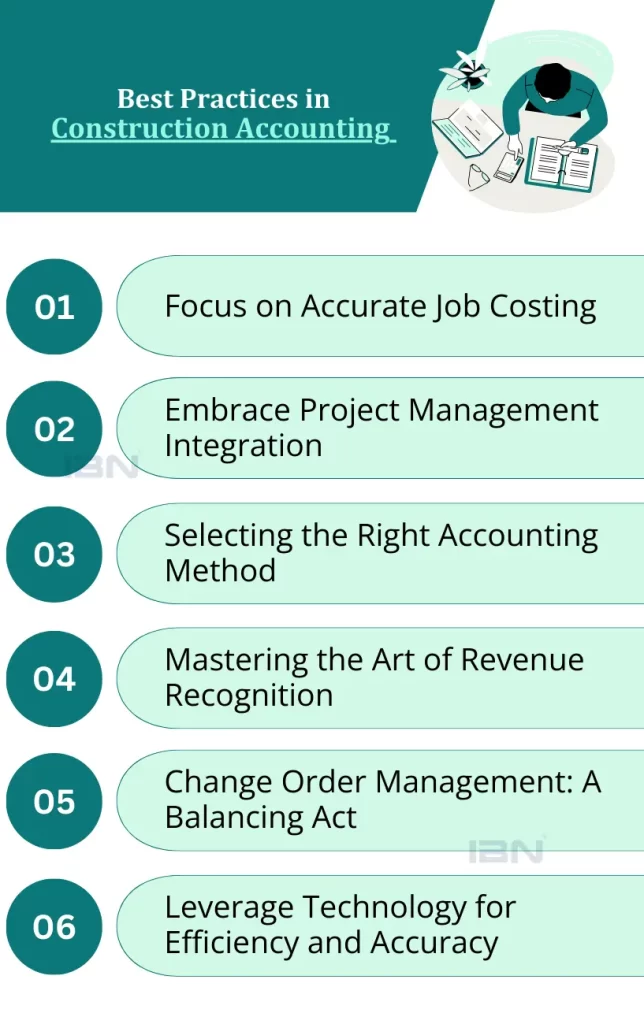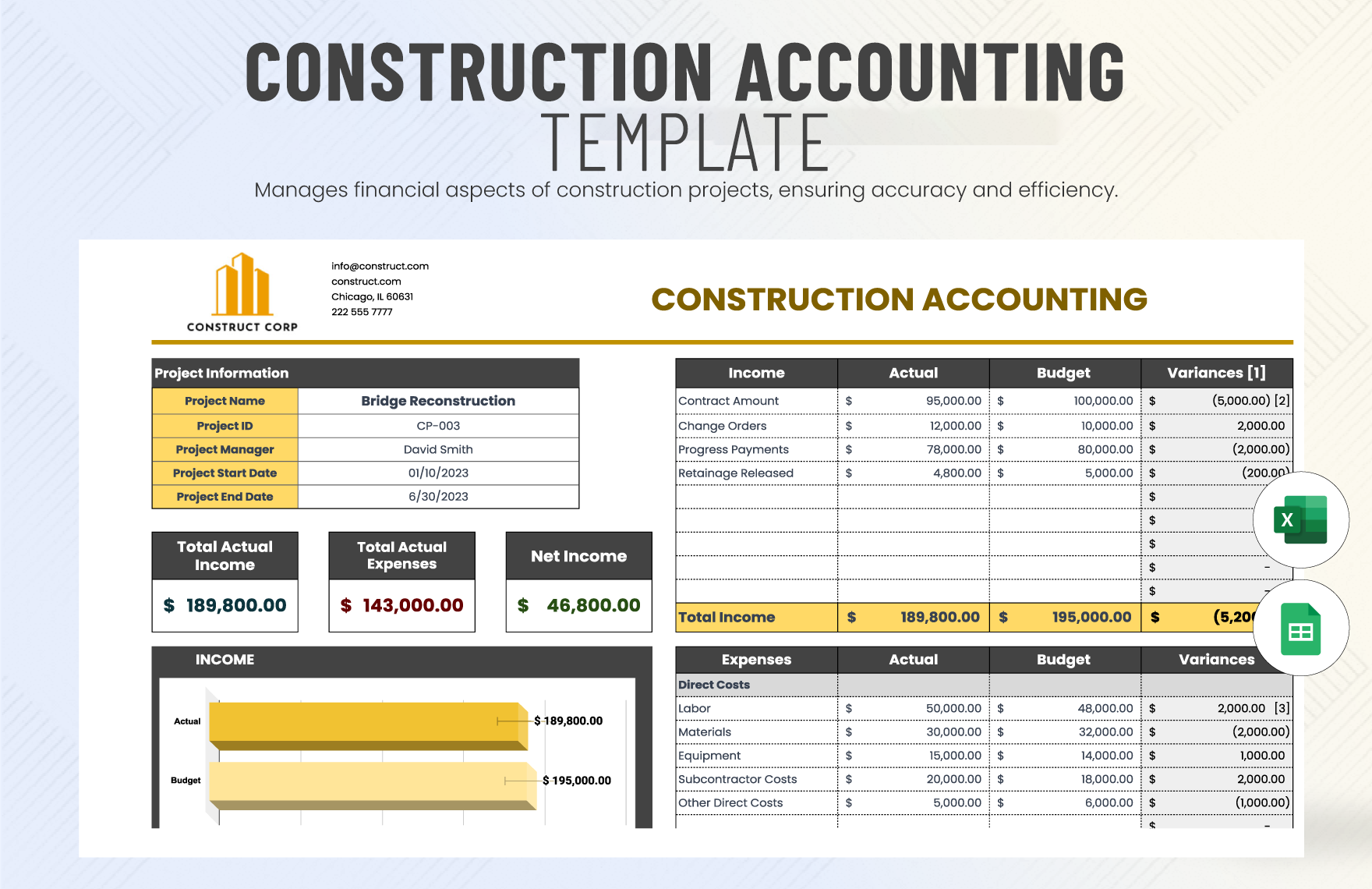Master Your Financials with Effective Construction Accounting Strategies
Master Your Financials with Effective Construction Accounting Strategies
Blog Article
Comprehending the Value of Building And Construction Accounting for Successful Job Administration

Function of Building And Construction Accounting
Construction audit works as the backbone of financial administration in the building and construction sector, making certain that jobs are finished within budget and economic objectives are satisfied. construction accounting. This specific audit strategy addresses the unique challenges dealt with in building and construction tasks, including differing project durations, varying prices, and numerous stakeholders
One of the primary functions of building accounting is to provide precise price evaluation and monitoring throughout the project lifecycle. This helps with informed decision-making, allowing project managers to change resources and timelines effectively. In addition, building and construction audit boosts cash flow management by keeping an eye on accounts payable and receivable, hence making certain that funds are readily available for prompt payments to providers and subcontractors.
Additionally, building audit help in compliance with market guidelines and coverage demands. It furnishes job supervisors with the needed financial information to prepare comprehensive economic statements, which are essential for audits and monetary reviews. By maintaining clear records, building accountancy fosters openness and accountability, crucial components in building trust fund among stakeholders. Ultimately, the role of building and construction accountancy expands beyond plain economic tracking; it is essential to tactical preparation and operational performance, driving the success of construction tasks in a competitive landscape.
Secret Components of Building Audit

Budgeting develops a financial framework that overviews job implementation, permitting supervisors to designate sources successfully and expect potential financial challenges. Accurate cost tracking is essential for surveillance expenditures in real-time, aiding to determine differences in between projected and actual prices. This makes it possible for prompt changes to maintain the project on budget.
Additionally, economic reporting provides stakeholders with a clear photo of the job's financial health. Normal records, such as profit and loss statements and capital analyses, promote informed decision-making and enhance transparency among all events entailed.
Additionally, conformity with market guidelines and audit standards is essential. This ensures that economic practices are not just efficient but additionally legal, securing the company against legal effects. By incorporating these vital elements, building accountancy promotes a structured method to managing funds, eventually adding to the successful conclusion of building tasks.
Benefits for Job Supervisors
Leveraging reliable building and construction accounting methods gives project supervisors with a multitude of benefits that enhance both operational performance and monetary oversight. One substantial benefit is enhanced budget plan monitoring. Accurate monitoring of earnings and expenditures permits project supervisors to monitor financial efficiency in actual time, ensuring projects stay within budget and facilitating timely modifications when essential.
In addition, construction audit enhances capital management, allowing job supervisors to expect economic needs and enhance resource appropriation. By understanding cash inflows and outflows, they can much better handle settlements to staff members, subcontractors, and providers, thus preventing pricey delays.
In addition, durable audit systems offer comprehensive coverage abilities. Project managers can produce reports that offer insights into task productivity, price variations, and resource usage. This data-driven strategy promotes notified decision-making, allowing managers to recognize possible problems proactively and carry out rehabilitative actions.
Finally, adherence to building and construction audit standards makes sure conformity with governing and lawful needs, decreasing the risk of penalties or disputes. Overall, efficient building accountancy equips job supervisors with the tools required to drive project success, enhance stakeholder confidence, and advertise long-term organizational growth.
Usual Obstacles in Building And Construction Bookkeeping
Several task managers experience considerable challenges original site in building accounting that can impede job success. One of the key obstacles is the complexity of tracking multiple work sites, each with distinct spending plans, timelines, and source allotments. This requires careful interest to detail, which can be frustrating without a durable accountancy system in position.
Furthermore, changing material prices and labor prices can complicate budget plan management, making precise forecasting challenging. Job supervisors usually struggle to resolve these prices with real expenses, bring about possible monetary discrepancies.
Additionally, building accounting involves compliance with numerous laws, including tax obligation obligations and labor legislations. Browsing these guidelines can be daunting, particularly for supervisors that may not have a solid bookkeeping background.
Another significant challenge is taking care of cash circulation, which is critical in the construction sector. Delays in invoicing, settlements from clients, or unanticipated project changes can develop money flow scarcities, jeopardizing the task's development.
Last but not least, effective interaction between task managers, accountants, and field groups is crucial. Misconceptions can result in imprecise monetary reporting, additionally complicating project management efforts. Resolving these obstacles proactively is essential for successful construction accountancy.

Ideal Practices for Effective Accounting
While navigating the complexities of building and construction audit can be overwhelming, embracing best practices can considerably enhance monetary administration and project success. One fundamental method is keeping prompt and precise records. Applying durable accountancy software tailored to building projects can improve data access, invoicing, and reporting, saving and lowering mistakes time.
In addition, establishing a clear budget plan and normal monitoring versus this budget are critical. Using a system of periodic economic reviews allows project managers to determine variances early, promoting timely decision-making. It is likewise important to separate task costs into direct and indirect categories, enabling clearer understandings right into success.
One more best technique entails cultivating open interaction amongst all stakeholders. Regular updates and collaborative conversations regarding financial condition can guarantee everybody is lined up and educated. Educating personnel in construction-specific audit principles even more improves expertise and precision.
Finally, making certain conformity with relevant browse around here bookkeeping criteria and policies is non-negotiable. Normal audits and internal reviews contribute to openness and liability, constructing trust with clients and stakeholders. By focusing on these ideal practices, building companies can maximize their accountancy processes, eventually driving task success and economic stability.
Final Thought
In final thought, construction audit plays a crucial role in guaranteeing successful task monitoring by promoting exact monetary oversight and boosting decision-making. By incorporating crucial parts such as cost estimate, cash money flow administration, and conformity, job supervisors can browse usual challenges and take advantage of best practices for reliable accountancy. Inevitably, a robust building and construction accountancy structure not only safeguards budget integrity but likewise contributes to the general economic health and wellness of construction projects, cultivating sustainable success within the industry.
By integrating these key parts, building audit cultivates a structured technique to taking care of monetary resources, ultimately contributing to the successful conclusion of construction projects.
Precise tracking of incomes and costs permits task supervisors to keep an eye on monetary efficiency in actual time, ensuring projects remain within budget and facilitating timely changes when essential.
Task managers can generate records that use insights right into project success, price variances, and source application.Many project managers come across substantial difficulties in see here now construction audit that can impede task success. construction accounting. Ultimately, a durable building bookkeeping structure not only safeguards budget plan integrity yet also adds to the total monetary health of building and construction tasks, fostering sustainable success within the market
Report this page